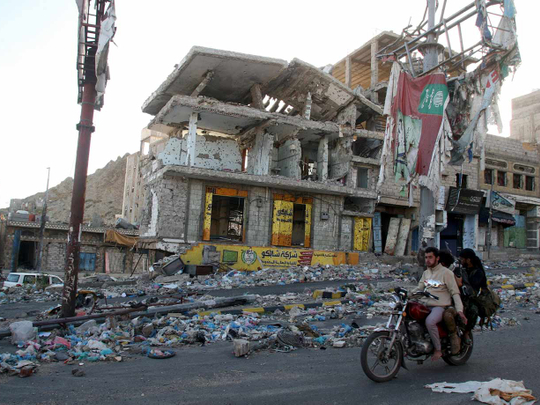
Dubai: Yemen, which has been plunged in deep-rooted internal problems for decades and recently in civil war, is facing a new threat: increasing presence of terrorist groups, namely Al Qaida and Daesh.
This factor, say analysts, could have a major destabilising effect on neighbouring states and the wider region.
Gulf states — including the UAE — have made it clear that they will not allow Yemen to fall to terrorist groups that have taken advantage of the power vacuum left there after Al Houthis overran the city.
The coalition has since reclaimed the city from the militias, but terrorist groups like Al Qaida and Daesh who regrouped and mobilised in the south during the fighting have used the opportunity to expand in the area in an attempt to create a safe haven for themselves, a factor that is increasingly seen with concern in Gulf capitals.
The terrorism threat particularly poses a new challenge to the Gulf region, and it can’t be eliminated without a political solutions to the Yemeni problems once the ongoing war is over, analysts said.
Many believe that filling the power vacuum has now become an urgent requirement in the south, which can be done through strengthening institutions and with the intervention of the international community in order to prevent Yemen from becoming a Syria-like hub for terrorists in the southern of the Arabian Peninsula.
“The absence of a central government, the failure of the state, lack of a unified security institutions and the tribal divisions along with other partitions among the Yemeni people make the countrythe ideal environment for the terrorist groups to flourish,” said Hassan Abu Haniyah, an expert in extremist groups based in Amman.
“The entire state is absent [in Yemen] and this will surely lead to the growth of Al Qaida and Daesh,” he added to Gulf News in an interview.
Even before the current political crisis in Yemen, which started in 2011 with calls to the former Yemeni president Ali Abdullah Saleh to step down, Yemen had been a fertile ground for the terrorist group of Al Qaida, analysts pointed out.
Al Qaida has appeared in Yemen even before other parts of the Middle East, including Iraq and Libya.
Current political crisis has further paved the way for terrorists groups to grow, they added.
“The concerns of the [Gulf states] are legitimate, and I don’t think there is any country that can ignore this danger or limit it,” Abdul Khaliq Abdullah, a UAE political scientist, told Gulf News.
Responding to a question on the course of action the Gulf States will take to face the terrorism danger; Abdullah said “it will be a battle in every sense of the word. It will be a political, strategic and military [battle],” said Abdullah.
“Saudi Arabia and the Gulf states will not accept Daesh to be a thorn in its side,” he stressed.
Saudi Arabia is leading an Arab coalition to restore the rule of the internationally recognised government of Abd Rabbo Mansour Hadi and quash the Al Houthi rebellion. Daesh has claimed responsibility for several attacks against troops loyal to Hadiand the coalition fighting Al Houthis.
After the coalition’s war against Al Houthis is over, a “political battle will start”, analysts said.
“In the long run, there will be an ideological battle, which is the most important one against terrorism and extremism,” Abdullah said.
Since Yemen, one of the most improvised countries in the world, cannot fight terrorism alone, analysts say there is a need for external assistance and coordination.
“Yemenis should stand up,” said Khaled Al Maeena, a Saudi political analysts and media consultant. “Yemenis should identify these people (terrorists). Who are these people? Where are they coming from?” he added to Gulf News.
Al Maeena strongly believes that the Yemenis themselves have a bigger share.
“It is for the Yemenis to realise the dangers. The Gulf states cannot be there forever ... It is for the Yemenis to choose peace and development over war and killing,” he said.
Yemeni analysts, especially in the south of the country believe that many “terrorist groups” in the south are mainly “human bombs planted by former Yemeni president Ali Abdullah Saleh and they are actually from the troops loyal to him,” according to Seif Al Jahafi, a political figure from the south.
“Should Saleh takes off his hand from the country, and mainly from the South, the threat will be eliminated,” he told Gulf News.
Former Yemeni president Saleh “has used Al Qaida in some conflicts especially in the south. But he has not created it,” said Omar Ashour, a security studies professor at Exeter University in an interview with Gulf News.
Terrorist groups in Yemen are “no longer small groups that would hit and hide,” he said. Their growth will make eliminating them in the future more difficult.
“Beheading operations wouldn’t eliminate terrorist groups in Yemen,” said Haniyah.
There is a need to create a non-violent mechanism to solve Yemen problems and reach a peaceful solution, but “this option is not on the table, because there is a real war going on,” added Ashour.












